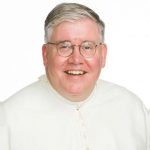
The Thirty-First Sunday in Ordinary Time, Cycle A
Jesus spoke to the crowds and to his disciples, saying,
“The scribes and the Pharisees
have taken their seat on the chair of Moses.
Therefore, do and observe all things whatsoever they tell you,
but do not follow their example.
For they preach but they do not practice.
They tie up heavy burdens hard to carry
and lay them on people’s shoulders,
but they will not lift a finger to move them.
All their works are performed to be seen.
They widen their phylacteries and lengthen their tassels.
They love places of honor at banquets, seats of honor in synagogues,
greetings in marketplaces, and the salutation ‘Rabbi.’
As for you, do not be called ‘Rabbi.’
You have but one teacher, and you are all brothers.
Call no one on earth your father;
you have but one Father in heaven.
Do not be called ‘Master’;
you have but one master, the Christ.
The greatest among you must be your servant.
Whoever exalts himself will be humbled;
but whoever humbles himself will be exalted” (Matt. 23:1-12).
Years ago, when I was a teenager, I was challenged by an Evangelical Protestant. (Back then, he would have been called a “Jesus freak.”) I had attended an evening service with a friend of mine from school who was a member of a Protestant fellowship in Los Angeles. At a certain point in the service, there were a number of testimonies, and my friend referred to my presence and to the fact that I was a Roman Catholic.
Well, the outpouring of interest in my salvation, both during and after the service, amazed me. Now it makes me wonder how many Protestants would be left in the world if we Catholics reacted to their misfortune (lack of a valid Eucharist, lack of a clear authority for the holiness and teaching of the Fathers and the saints and mystics of the Church, and so on) in the same way as those kind Christians reacted to me more than forty years ago.
A young man, earnest and kind, accosted me and tried to persuade me to abandon the Catholic Church. I replied that I did not want to be without the guidance of the teaching office, the Magisterium of the Church (I remember explaining this “non-biblical” term to him!), considering how troubled and confused the modern world was. Imagine, that was in 1975 or so: even though the culture has gotten more troubled since, in the meantime we have had the bulwark of the Magisterium of St. John Paul II and Pope Benedict XVI, and in a certain sense there is less confusion now than back then.
But the wily young enthusiast hit me with a passage of Scripture that stumped me. He gave it in the King James Version; I’ll give it in the version used in American Catholic liturgy:
As for you, the anointing that you received from him remains in you, so that you do not need anyone to teach you. But his anointing teaches you about everything and is true and not false; just as it taught you, remain in him (1 John 2:27, emphasis added).
Christians have the anointing of the Spirit and so do not need to be taught! As long as we remain in Jesus, the Spirit teaches us directly all that we need to know. Now, how was I to respond to this objection to being taught by the authority of the Church?
Today’s Gospel lesson seems to lead in the same direction: “As for you, do not be called ‘Rabbi.’ You have but one teacher, and you are all brothers.”
Surely, St. John’s words are true, as is indeed what Christ tells us: we are not teachers, but rather we have one teacher, and all the rest are equals and brothers. God’s word does not err. So what could it mean that we do not need anyone to teach us and that we ourselves should not claim to be teachers of others, since all Christians are equal?
The question of what it means to teach and to be taught is an ancient one that goes back a long way into the Greek philosophical tradition and was of great interest to the early Fathers of the Church. Not surprisingly, it is St. Thomas Aquinas again, in his wonderful commentary on St. Matthew’s Gospel, who brings the whole tradition together. Commenting on this Sunday’s passage, he says:
What does he intend to say here? He means that that one is strictly speaking a teacher who has his teaching from himself and does not simply diffuse to others what has been handed on to him by someone else. Thus only one is the teacher, namely God, whose teaching is strictly his own. Others are “teachers” only as ministers of his teaching. . . . How can a man know that his teaching is not his own? It is very clear when he notices that it is not in his power to make others understand his teaching as he wills, but cannot. No, rather, only God can do that, who alone can enlighten the heart.
The light of our understanding is a gift implanted in us by God. He is the only one to whom our knowledge can be radically traced back, whether it is natural knowledge or the supernatural knowledge of faith. From him we have the fundamental power to know the being of things, their unity, their identity with themselves, and their difference from everything else. These things cannot be taught by anyone but the Creator of our nature—indeed, they are the very conditions of the possibility of knowledge.
Just as a physician does not give us the nature that works in us to cure us under his care, so our human teachers do not give us the deep, basic knowledge that enables us to receive their help, the light of our intelligence and reason. This is simply a gift of God the creator. All our human teachers do is indicate by examples and words what is already implied in our basic understanding of reality. We need their practical direction, but they do not give us the basic ability to know, just as, again, physicians work with our bodily powers to bring forth the healthy processes that are already there without creating these processes.
Deep in our soul, in the least knowledge we have, is a gift that only God can give and that we are using all the time, even in the least kinds of every day knowledge we have. This is all the more marvelous when we consider that, in addition to all the natural knowledge we have or can have, we also have what Jesus has revealed to us about himself and about his Father and their Holy Spirit—and about ourselves.
We realize even more deeply that we know things that no one could ever teach us, only God. Thus, the Magisterium of the Church simply directs the hearts of those who have the Christian faith already infused in them by God’s grace at baptism. The teachers of the Church simply indicate to us by examples and words, by signs, the meaning of the mysteries of faith that are already implanted in our souls.
How great, then, is the dignity of each Christian, even the simplest believer of whom it can be said that he does not need to be taught, since the grace of faith, the anointing, remains in him! No wonder St. Thomas tells us in his commentary on the Apostles’ Creed that, because of the grace of the faith, the least little old lady, with no education, has more wisdom than all the philosophers of the Greek world. They wondered what it was to teach and to learn, but we have the Teacher and his word dwelling in our very hearts.
How wonderful, then, to be a Catholic and to have both the indwelling Spirit and the teaching of the Church!



